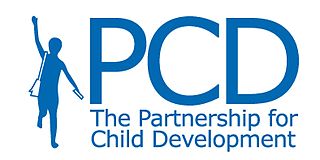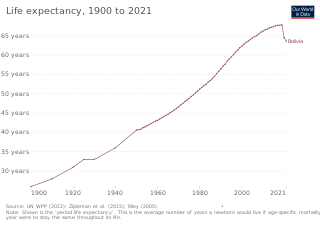
The Bill & Melinda Gates Foundation (BMGF) is an American private foundation founded by Bill Gates and Melinda French Gates. Based in Seattle, Washington, it was launched in 2000 and is reported to be the second largest charitable foundation in the world, holding $69 billion in assets as of 2020. The primary stated goals of the foundation are to enhance healthcare and reduce extreme poverty across the world, and to expand educational opportunities and access to information technology in the U.S. Key individuals of the foundation include Warren Buffett, chief executive officer Mark Suzman, and Michael Larson.

Malnutrition occurs when an organism gets too few or too many nutrients, resulting in health problems. Specifically, it is "a deficiency, excess, or imbalance of energy, protein and other nutrients" which adversely affects the body's tissues and form. Malnutrition is not receiving the correct amount of nutrition.

Danone S.A. is a French multinational food-products corporation based in Paris. It was founded in 1919 in Barcelona, Spain. It is listed on Euronext Paris, where it is a component of the CAC 40 stock market index. Some of the company's products are branded Dannon in the United States.

CGIAR is a global partnership that unites international organizations engaged in research about food security. CGIAR research aims to reduce rural poverty, increase food security, improve human health and nutrition, and sustainable management of natural resources.

Primary health care (PHC) is "essential health care" that is based on scientifically sound and socially acceptable methods and technology. This makes universal health care accessible to all individuals and families in a community. PHC initiatives allow for the full participation of community members in implementation and decision making. Services are provided at a cost that the community and the country can afford at every stage of their development in the spirit of self-reliance and self-determination. In other words, PHC is an approach to health beyond the traditional health care system that focuses on health equity-producing social policy. PHC includes all areas that play a role in health, such as access to health services, environment and lifestyle. Thus, primary healthcare and public health measures, taken together, may be considered as the cornerstones of universal health systems. The World Health Organization, or WHO, elaborates on the goals of PHC as defined by three major categories, "empowering people and communities, multisectoral policy and action; and primary care and essential public health functions as the core of integrated health services[1]." Based on these definitions, PHC cannot only help an individual after being diagnosed with a disease or disorder, but can actively contribute to preventing such issues by understanding the individual as a whole.

The International Food Policy Research Institute (IFPRI) is an international agricultural research center founded in 1975 to improve the understanding of national agricultural and food policies to promote the adoption of innovations in agricultural technology. Additionally, IFPRI was meant to shed more light on the role of agricultural and rural development in the broader development pathway of a country. The mission of IFPRI is to provide research-based policy solutions that sustainably reduce poverty and end hunger and malnutrition.
The Earth Institute is a research institute at Columbia University created in 1995 for addressing complex issues facing the planet and its inhabitants, with a focus on sustainable development. With an interdisciplinary approach, this includes research in climate change, geology, global health, economics, management, agriculture, ecosystems, urbanization, energy, hazards, and water. The Earth Institute's activities are guided by the idea that science and technological tools that already exist could be applied to greatly improve conditions for the world's poor, while preserving the natural systems that support life on Earth.

The Partnership for Child Development (PCD) is a research and technical assistance group based at Imperial College London that seeks to improve health and nutrition in school-age children and youth in low-income countries, thereby improving their education outcomes. PCD was formed in 1992 at the University of Oxford to bridge gaps between academia, funding bodies and the education and health sectors in low-income countries.

CABI is a nonprofit intergovernmental development and information organisation focusing primarily on agricultural and environmental issues in the developing world, and the creation, curation, and dissemination of scientific knowledge.
Nutritional rating systems are used to communicate the nutritional value of food in a more-simplified manner, with a ranking, than nutrition facts labels. A system may be targeted at a specific audience. Rating systems have been developed by governments, non-profit organizations, private institutions, and companies. Common methods include point systems to rank foods based on general nutritional value or ratings for specific food attributes, such as cholesterol content. Graphics and symbols may be used to communicate the nutritional values to the target audience.
The Grand Challenges in Global Health (GCGH) is a research initiative launched by the Bill & Melinda Gates Foundation in search of solutions to health problems in the developing world. Fifteen challenges are categorized in groups among seven stated goals plus an eighth group for family health. The disciplines involved include immunology, microbiology, genetics, molecular biology and cellular biology, entomology, agricultural sciences, clinical sciences, epidemiology, population and behavioral sciences, ecology, and evolutionary biology.

The Global Alliance for Improved Nutrition (GAIN) is a non-profit foundation based in Geneva, Switzerland. GAIN was developed during the UN 2002 Special Session of the General Assembly on Children. GAIN’s activities include improving the consumption of nutritious and safe foods for all. The foundation is supported by over 30 donors and works closely with international organisations and United Nations agencies. It has a 20-year history of food system programmes with a focus on adolescent and child nutrition, food system research, fortification, small and medium enterprise assistance, biofortification of crops, and reducing post-harvest losses.

In terms of key indicators, health in Bolivia ranks nearly last among the Western Hemisphere countries. Only Haiti scores consistently lower. Bolivia's child mortality rate of 69 per 1,000 live births is the worst in South America. Proper nourishment is a constant struggle for many Bolivians. Experts estimate that 7 percent of Bolivian children under the age of five and 23 percent of the entire population suffer from malnutrition. Another health factor in Bolivia is sanitation.
Sight and Life is a think tank that focuses on eliminating malnutrition in children and women of childbearing age.

The World Gastroenterology Organisation (WGO) is an international federation of over 100 national GI societies and 4 regional associations of gastroenterology representing over 50,000 individual members.
Health Disparities Centers are institutions in the United States that cover a broad range of needs and focus areas to decrease currently disproportionate illness and disease rates that lead to health disparities. They also promote the engagement, empowerment and recruitment of underrepresented populations in health professions. Many programs devote significant resources to developing cultural competency training to promote the delivery of culturally sensitive healthcare by faculty and staff, as well as current and future healthcare providers. These services are usually tailored to meeting specific goals or missions of the individual components common in most of the operating Health Disparities Centers.
Global Health Initiatives (GHIs) are humanitarian initiatives that raise and disburse additional funds for infectious diseases – such as AIDS, tuberculosis, and malaria – for immunizations and for strengthening health systems in developing countries. GHIs classify a type of global initiative, which is defined as an organized effort integrating the involvement of organizations, individuals, and stakeholders around the world to address a global issue.
The social protection floor (SPF) is the first level of protection in a national social protection system. It is a basic set of social rights derived from human right treaties, including access to essential services and social transfers, in cash or in kind, to guarantee economic security, food security, adequate nutrition and access to essential services.
The Feed the Future Initiative (FTF) was launched in 2010 by the United States government and the Obama Administration to address global hunger and food insecurity. According to Feed the Future, it is "the U.S. government's global hunger and food security initiative."
Robert Michael Hecht is an American global health policy and financing expert. Hecht is currently Founder and President of Pharos Global Health Advisors. He has previously held positions with the World Bank, UNAIDS, the International AIDS Vaccine Initiative, and Results for Development Institute. He serves as a lecturer at Yale University’s Jackson Institute for Global Affairs and is a clinical professor at the Yale School of Public Health. He has published on a range of topics in global health and development, with a special focus on the economics, financing, and policies for infectious diseases, nutrition, and broader health system reform. He has been an advisor to the President's Emergency Plan for AIDS Relief (PEPFAR), the World Health Organization, and UNITAID. Hecht holds a BA from Yale and a PhD from Cambridge University.









